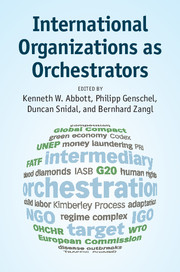Book contents
- Frontmatter
- Contents
- List of Figures
- List of Tables
- List of Contributors
- Acknowledgments
- List of Abbreviations
- Part I Introduction
- Part II Managing states
- 2 Orchestrating policy implementation
- 3 Orchestration on a tight leash
- 4 Orchestration by design
- 5 Efficient orchestration?
- 6 Orchestrating monitoring
- 7 Orchestrating enforcement
- Part III Bypassing states
- Part IV Implications
- References
- Index
7 - Orchestrating enforcement
international organizations mobilizing compliance constituencies
Published online by Cambridge University Press: 05 April 2015
- Frontmatter
- Contents
- List of Figures
- List of Tables
- List of Contributors
- Acknowledgments
- List of Abbreviations
- Part I Introduction
- Part II Managing states
- 2 Orchestrating policy implementation
- 3 Orchestration on a tight leash
- 4 Orchestration by design
- 5 Efficient orchestration?
- 6 Orchestrating monitoring
- 7 Orchestrating enforcement
- Part III Bypassing states
- Part IV Implications
- References
- Index
Summary
Abstract
The most broadly shared conclusion in scholarship on dispute settlement, legalization and compliance over the past two decades is probably the virtue of granting private actors access to international courts and tribunals. Yet for all its benefits, private access is not a universally available and effective institutional design option. This chapter shows that IGOs sometimes compensate for these limits by turning to a strategy of orchestration, and identifies the conditions under which this takes place. Where procedures for private enforcement are lacking, orchestration can offer a substitute, as when IGOs independently create mechanisms for compliance complaints. Where such procedures exist but private actors face resource barriers, orchestration can offer a complement, as when IGOs provide funding and training to potential litigants. This chapter argues that orchestration of enforcement in both its variants will only happen when three necessary conditions are fulfilled: a) IGOs lack sufficient capabilities to effectively enforce compliance through other governance means; b) private actors hold privileged information about state compliance; and c) IGOs enjoy a capacity for independent action, as shaped by entrepreneurial resources and state oversight.
Introduction
The most broadly shared conclusion in scholarship on dispute settlement, legalization and compliance over the past two decades is probably the virtue of granting private actors access to international courts and tribunals (Burley and Mattli 1993; Helfer and Slaughter 1997; Stone Sweet 1999; Keohane et al. 2000; Tallberg 2002a; Raustiala 2004; Alter 2006).
- Type
- Chapter
- Information
- International Organizations as Orchestrators , pp. 166 - 188Publisher: Cambridge University PressPrint publication year: 2015
- 11
- Cited by



